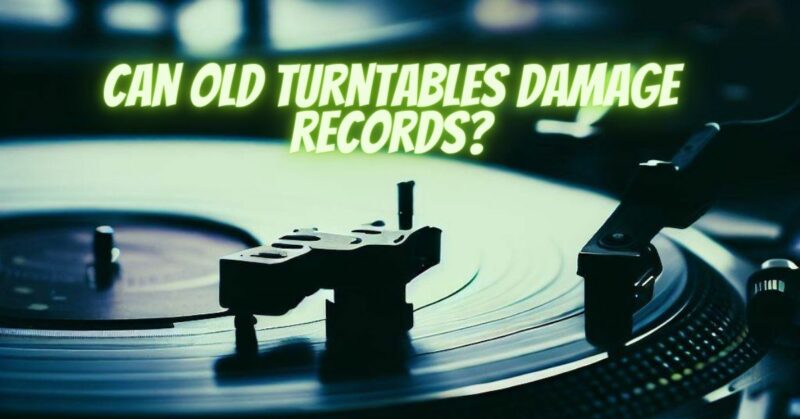Old turntables can harm your records in a number of ways. Over time, the components of a turntable can wear out or become misaligned, which can lead to poor tracking, increased friction, and damage to the grooves of your records.
Poor tracking is one of the most common ways that old turntables can damage your records. If the tonearm or stylus is not properly aligned, the stylus will not be able to track the grooves of your records accurately. This can lead to skipping, scratching, and other damage.
Increased friction is another way that old turntables can harm your records. If the turntable platter is not spinning at the correct speed, or if the stylus is worn, it will create more friction between the stylus and the record. This can lead to heat buildup and damage to the grooves of your record.
A dirty or damaged stylus can also cause scratches and other damage to the grooves of your records. It is important to clean your stylus regularly and to replace it as needed.
Worn-out or damaged turntable components, such as the platter, tonearm, or bearings, can cause the turntable to vibrate excessively. This can lead to skipping, scratching, and other damage to your records.
In addition to the above, here are some other ways that old turntables can harm your records:
- Incorrect VTF (vertical tracking force): If the VTF is too high, it can put too much pressure on the stylus, causing it to dig into the grooves of your records and damage them. If the VTF is too low, the stylus may not be able to track the grooves of your records accurately, which can also lead to damage.
- Anti-skate mistracking: Anti-skate is a force that counteracts the centrifugal force created by the rotating record. If the anti-skate is not properly adjusted, it can cause the stylus to pull towards the center of the record, which can damage the grooves.
- Dust and dirt: Dust and dirt can accumulate on the turntable platter and stylus, which can cause the stylus to scratch the grooves of your records. It is important to clean your turntable regularly to remove dust and dirt.
- Improper handling: Dropping or bumping your turntable can damage the internal components and cause the turntable to mistrack, which can damage your records.
If you are concerned about your old turntable damaging your records, there are a few things you can do:
- Have your turntable professionally serviced: A qualified technician can inspect your turntable and make any necessary adjustments to ensure that it is tracking and playing your records properly.
- Replace the stylus regularly: A worn or damaged stylus can cause significant damage to your records. It is important to replace the stylus on your turntable regularly, according to the manufacturer’s recommendations.
- Clean your records regularly: Dirty records can cause the stylus to wear out prematurely and can also lead to skipping and scratching. It is important to clean your records regularly with a soft brush and a mild record cleaning solution.
- Upgrade your turntable: If your old turntable is in poor condition, or if it does not have the features you need, such as a built-in phono stage or a variable speed control, you may want to consider upgrading to a new turntable.
By taking these steps, you can help to protect your records from damage and ensure that they will last for many years to come.
Here are some additional tips for preserving your vinyl records:
- Store your records vertically in a cool, dry place.
- Avoid storing your records in direct sunlight or in humid conditions.
- Handle your records by the edges to avoid touching the grooves.
- Clean your records regularly with a soft brush and a mild record cleaning solution.
- Use a record inner sleeve to protect your records from dust and dirt.
- Use a record outer sleeve to protect your records from scratches and other damage.
By following these tips, you can help to keep your vinyl records in pristine condition for many years to come.


